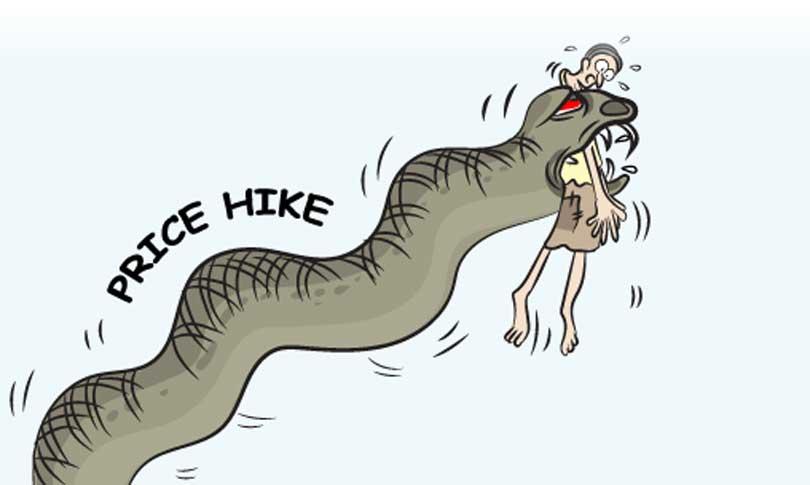Reply To:
Name - Reply Comment

Amidst issues cropped up due to the COVID-19 pandemic such as the drastic drop in export revenue and collapse of the tourism industry, government is struggling to maintain the smooth supply of essential items to the general public and to contain the soaring prices. The milk powder shortage that emerged a few weeks ago is still to be sorted out; there are fears about continuous cooking gas supply, following the recent shortage and the demands by some suppliers to increase the prices. The prices of sugar and rice are yet to be brought down to the level that has been stipulated by the government by gazette notifications, despite the declaration of emergency Regulations to streamline the essential food supplies.
The government issued several gazette notifications during the past one year fixing prices for rice and sugar, but the traders dumped them into the trash bin and increased the prices at their own will. Those who imported sugar under a duty reduced from Rs. 50 to 25 cents a kg, and supposed to sell a kg at Rs. 85 have been selling it at an exorbitant price of Rs. 220 a kg until last month. The authorities including the newly-appointed Commissioner General of Essential Services raided the unauthorized warehouses of sugar and “purchased” the items in them, but at a higher price of Rs.115. A new price of Rs. 125 was fixed for the consumer, but people can buy sugar at that price only at the SATHOSA outlets and also only a limited quantity.
During the first six months of this year, the country has imported 600,000 tons of sugar; a quantity sufficient for more than one year’s consumption, according to Daily FT. Sri Lanka’s annual sugar consumption is between 350,000 and 400,000 tons. Therefore, there cannot be a shortage in the market, but still the consumers are struggling to buy sugar at prices fixed by the government and no longer the reports of raids on sugar warehouses are being heard.
Similarly, the authorities raided the rice mills in the North Central Province for the past two weeks, claiming that the large-scale rice mill owners were hoarding rice resulting in price hikes. Also the government fixed prices for various varieties of rice last week. Accordingly, Keeri Samba should be sold at Rs. 125, while Samba, Nadu and Kekulu varieties at Rs.103, Rs. 98 and Rs. 95 respectively. However, the rice at those prices is yet to reach the consumers.
Subsequent to the raids on mills, a group of monks and farmers agitated against those raids, alleging the government’s move would prevent the mill owners who pay a higher price than the government-stipulated prices from purchasing paddy from the farmers. Agriculture Minister Mahindananda Aluthgamage told them that the government would purchase paddy at Rs. 60 per kg during the forthcoming Maha Season, while accusing the mill owners for selling rice at exorbitant prices. Agitators did not accept it as it was seemed as a ploy to buy time.
President’s Spokesman Kingsley Ratnayaka in a statement on September 11 said that despite agreements being reached between President Gotabaya Rajapaksa and mill owners on the prices of paddy and rice, “market price of rice rose and a kilo of Nadu rice being sold at Rs.125, Samba at Rs.150 and Keeri Samba at Rs.225.” Mr.Ratnayaka and the ministers compare the prices of paddy that is bought by the mill owners and the prices of rice they sell in order to show that mill owners incur a huge profit. Their profit has to be calculated based on the expenditure they incur to produce a kg of rice grains and the selling price of rice.
However, the mill owners have no moral rights to hoard paddy or rice and to sell them above the agreed norms. There cannot be a shortage of rice in the market either, as around 3,000,000 metric tons of rice should have been produced in the last Yala and Maha Seasons, based on the statistics of the Department of Census and Statistics, while the annual rice consumption in the country stands at 2,340,000 MT, according to the Agriculture Ministry.
Nevertheless, expecting fair play from traders is self-deception. Therefore, the government must find means to manage the market, other than price control, such as strengthening competition. However, the government’s main competing tool to control the rice market; the Paddy Marketing Board (PMB) is handicapped by lack of resources and storage facilities, apart from lack of interest on the part of successive governments and authorities.
There are 323 warehouses belonging to the PMB with a capacity to store 323,700 metric tons, but with the store capacity available under co-operative network and district secretariats, the PMB’s total capacity is 500,000 Metric Tons. But the annual paddy production stands at around 5 million metric tons. Hence the current crisis is inevitable, even if the PMB has sufficient funds to purchase paddy.